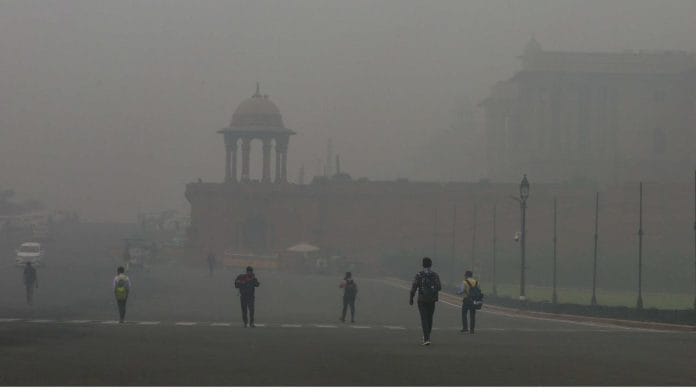New Delhi: Outdoor air pollution from coal, liquid gas and petrol use led to over 17 lakh deaths in India in 2022, according to the latest Lancet Countdown on Health and Climate Change. This is a 38 percent increase from 2010, said the report released Tuesday. Globally, there were 2.5 million deaths due to ambient air pollution from fossil fuels in 2022.
Coming at a time when Delhi’s Air Quality Index levels have remained above 250 (‘poor’ category) for the second week in a row, the report focuses heavily on how ambient air pollution has claimed lives globally. In India, specifically, emissions from fossil fuel usage rose by 21 percent between 2016 and 2022, and in certain sectors like transport, 96 percent of all energy needs came from fossil fuels.
Apart from fossil fuel usage, increased instances of wildfires too, said the report, led to 1.54 lakh deaths globally in 2024.
“The delay in transitioning away from fossil fuels and towards healthy, renewable energy… is costing lives and straining the economy,” it read.
“This Lancet report is a horrifying confirmation: India is paying with its people’s lives for the world’s fossil fuel addiction,” said Harjeet Singh, climate activist and founding director of Satat Sampada Climate Foundation, in a statement. “Our nation’s reliance on coal, oil, and gas is causing a public health emergency, with air pollution alone costing millions of lives annually.”
This is the ninth edition of the Lancet Global Countdown Report, compiled yearly starting 2015. The report is an international, peer-reviewed publication where scientists from around the world assess how global health indicators are impacted by global climate change processes.
Apart from the data on air pollution, the report also cautioned against other factors pertaining to global climate that have a negative impact on human health—heatwaves, floods, landslides, and other extreme weather events. This edition of the report also focused on how the global transmission potential of certain diseases, like dengue, has increased manifold because of changing climatic conditions.
With 2024 being the hottest year on record, there was a considerable increase in the number of deaths directly due to heat, as well as the number of days in a year that vulnerable people (elderly, children, sick) were exposed to high temperatures. Not to mention, the world saw $1 trillion worth of losses in 2024 because of the hours of productivity lost to extreme heat.
“This year’s report reveals that heat-related mortality per 100,000 increased by 23 percent since the 1990s, with total heat-related deaths reaching an average of 546,000 annually between 2012 and 2021,” read the Lancet report.
Also Read: 0.1 mm of rain in Noida & AQI down by 20 points—how Delhi’s cloud seeding trial went
‘All hands on deck’ needed for climate action
The report, released days before global leaders are expected to meet at the climate change Conference of Parties (COP30) in Brazil’s Belem, urged governments to act to reduce fossil fuel emissions urgently.
This year, the report mentioned the fact that certain countries, led by the United States after Donald Trump’s return as president, backtracked on climate commitments, such as the 2015 Paris Agreement, and withdrew from the World Health Organisation. The de-centring of climate action from global conversations was visible in the fact that in UN General Debate statements by countries, mentions of health and climate change declined from 62 percent in 2021 to 30 percent in 2024.
“We already have the solutions at hand to avoid a climate catastrophe—and communities and local governments around the world are proving that progress is possible. From clean energy growth to city adaptation, action is underway and delivering real health benefits—but we must keep up the momentum,” said Dr Marina Romanello, executive director of the Lancet Countdown, in a press statement.
(Edited by Mannat Chugh)
Also Read: Delhi air pollution warning system could only predict 5 of 14 ‘severe’ days last winter—CEEW study






